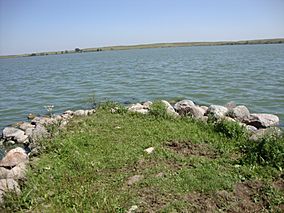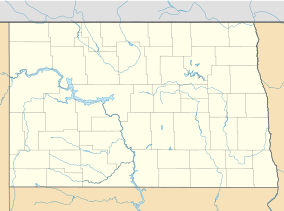Beaver Lake State Park (North Dakota) facts for kids
Quick facts for kids Beaver Lake State Park |
|
|---|---|
 |
|
| Location | Logan County, North Dakota, United States |
| Nearest city | Wishek, North Dakota |
| Area | 273.16 acres (110.54 ha) |
| Elevation | 2,070 ft (630 m) |
| Designation | North Dakota state park |
| Established | 1932 |
| Visitors | 18,497 (in 2009-2011 (average)) |
| Administrator | North Dakota Parks and Recreation Department |
| Website | Beaver Lake State Park |
Beaver Lake State Park is a fun place for outdoor activities in North Dakota. It's located in Logan County, right between the towns of Napoleon and Wishek. This state park covers about 273 acres of land.
The park sits on the western side of Beaver Lake, which is a large lake covering about 968 acres. Visitors can enjoy many activities here. You can go hiking on trails, take a boat out on the lake, or swim in the water. It's also a great spot for fishing. If you want to stay overnight, the park offers cabins and a campground.
Discovering Beaver Lake State Park
How the Park Started
Beaver Lake State Park began because local people really wanted a special place to honor the early settlers. These settlers had lived along the shores of Beaver Lake a long time ago. In 1929, residents met to discuss creating a state park.
Their hard work paid off! The park was officially dedicated in July 1932. This was a big moment for the community.
Building the Park's Features
A year later, in 1933, the water level of Beaver Lake was raised. This happened when a dam was built on Beaver Creek. This made the lake even better for recreation.
From 1935 to 1936, a group called the Works Progress Administration (WPA) helped improve the park. The WPA was a government program that gave jobs to people during a tough economic time. These workers built many things in the park. They created new roads and paths for walking. They also built an earthen dock and a picnic area for visitors to enjoy.
You can still see a stone monument in the park today. It remembers all the important work done by the WPA laborers.
 | William L. Dawson |
 | W. E. B. Du Bois |
 | Harry Belafonte |


